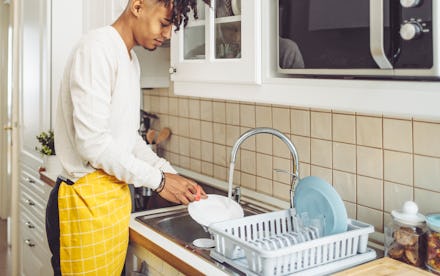The meditative power of washing dishes

Growing up, owning a dishwasher was more of a concept than a daily reality. We used it when we were too stuffed, too Itis-stricken to make dishes anew after experiencing mom’s culinary wizardry, mainly after elaborate holiday dinners. Against my wishes, I was ushered into the ways of washing by hand around the Age of Donkey Kong Country Tournaments. A decree informed me that kitchen beautification was now part of my Way of Life.
At dinner, I grew to dread those final meal-ending bites, knowing the impending time in the kitchen would keep me from Mario Kart and rehearsing the choreography from Sister Act 2’s “Joyful, Joyful.” I fought it. I failed.
Once I left home and became A Young Man with Roommates, there was no joy to be found in the suds. Only obligation and judgment over greasy, unwashed plate bottoms. The horror. A few years ago, while couchsurfing and navigating life in a city-run shelter with my mental health on the decline, volunteering to wash dishes in my homies' sanctuaries after a glorious meal gave me a moment of peace on days when I wasn’t sure where I was sleeping. It allowed me to show gratitude for the meal and remember what safety and predictability felt like in my body.
Now, building a new life in my apartment in Brooklyn, the Casa de Joy, sink time has aided in developing rituals that promote thriving, create moments for mindfulness and reflection, and inspire gratitude for another day of life in Janet Jackson’s America. And it keeps my sanctuary looking lived-in, not struggled-in. Here are a few ways dishwashing has helped me thrive in the war on spiritual ashiness.
It helps me embrace a breakfast-forward lifestyle
Despite being breakfast-positive, I get into ruts where I hop up out the bed and juke into the day unhydrated and unmoisturized, fueled by coffee and capitalism. No good breakfast sausage. No creamy grits. Cleaning the last of yesterday from the sink during my quiet morning routine gives me a cue to go ahead and feed myself and take my meds, and BAM! Nutrition, ho.
In the past, it helped me channel calm amidst chaos
During the years I spent fighting to stay in the Land of the Living —while also teaching, writing, speaking, and showing up (and not showing up) — from inside a hellacious Manhattan shelter room, scrubbing pans with pals before retreating to my dungeon helped me grab a few scraps of normalcy and dignity, feel grounded in the middle of my private hurricane, and feel helpful when I felt worthless.
I never felt comfortable or clean in the shelter’s kitchen. I opted against sharing time on the four-burner stove and sticky sink with eight floors of New Yorkers in transition with varying cleanliness philosophies. I embraced a paper-plastic, microwave-only existence, so: deli sammiches aplenty. I never expected to miss putting my back into it over a sudsy roasting pan, but there I was, eating something hot from World Market again and longing for that deep post-meal sigh that signified I’d defeated the Itis and charged up enough energy to put food away and do the kitchen restoration, after using dishes as if I got paid per dirty item while feeding people I love in my own space.
Unsanctuaried and trying to project okayness while deciding daily against killing myself amidst fist-fighting neighbors and shit-spangled bathrooms, refilling guests’ drinks “because I’m up anyway” and making dirty plates disappear so they could chillax after such masterful kitchening helped me feel a little less fucked up for a moment. It helped me try to remember the love and joy I scrubbed from those pots and platters I dreaded so long ago.
I use it as a form of mindfulness to check in with my body and senses
Queen Mother Phylicia Rashad once said meditation can be any activity — doing a puzzle, chopping vegetables, doing hair — that quiets the mind and requires all of your attention. So I try to find those moments to shirk distractions and notifications to be present throughout the day.
Divesting from the Multitasking Industrial Complex for a bit at the sink, I notice how my stress appears in my scrunched-up shoulders and my hurried scrubbing. I remember to breathe and feel the coils of the stainless steel scrubber pressing into my palm as I vanquish dried-on grits on a soapy battlefield. I smell the eucalyptus in the oil diffuser in the living room dancing with the pineapple coconut candle on the microwave.
It helps me de-stress and breathe
I color and watch Living Single afterward after therapy sessions or after washing dishes, but getting in the sink gives me quiet time to breathe, use my hands, and release the weight of holding emotional space for grieving healthcare workers and their weight.
It helps establish a sense of autonomy and control
Part of trauma recovery involves cultivating a sense of safety and stability. This means establishing rituals and an environment that help me feel safe in my body and this space. It reminds me I’m okay and not in that transient, spiritually ashy place. Enter: washing dishes in the morning in an act of retroactive defiance.
I don’t unlock, relock, and stare at the door with wonder anymore. And I don’t go all the way back down the shelter rabbit hole every time I reach for the sponge. But approaching nine months in my new home, that silent morning appointment at the sink still feels like keeping a daily promise to myself. And some days, that’s enough.